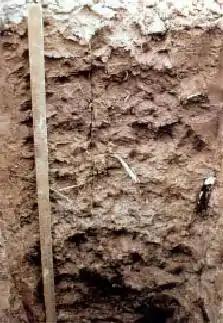
Menfro soil is a series of deep, well drained, moderately permeable soils formed in 6-to-20-foot (1.8 to 6.1 m) thick loess deposits. It is found in central and eastern Missouri and west-central and southwestern Illinois on upland ridgetops, backslopes, and benches adjacent to the Missouri and Mississippi rivers and their major tributaries. Menfro soils are prime farmland where the slope is less than 6 percent.
Menfro soil strata consist of:
| Surface layer | dark brown silt loam |
| Subsurface layer | brown silt loam |
| Subsoil - upper | brown silt loam |
| Subsoil - lower | dark brown silty clay loam |
| Substratum | brown silt loam |
Menfro is the state soil of Missouri.[1][2][3] It was the first soil to go on display when Scientists from the Natural Resources Conservation Service of the USDA, the Soil Science Society of America and others worked with exhibit designers from the Smithsonian Institution on a display of soil monoliths from every state.[4]
Notes
- ↑ "HCR10 - Menfro Soil". Missouri House of Representatives. 2004-05-07. Retrieved 2010-07-24.
- ↑ "Activity History for HCR10". Missouri House of Representatives. 2004-11-04. Retrieved 2010-07-24.
- ↑ "Journal of the Senate". Missouri Senate. 2004-05-07. Retrieved 2010-07-24.
- ↑ "USDA and Smithsonian Institution Present Soils Display". USDA Natural Resources Conservation Service. 2005-02-16.
References
- "Menfro Series". National Cooperative Soil Survey. United States Department of Agriculture. August 2004. Archived from the original on 2009-03-22. Retrieved 2008-12-10.
- "Menfro -- Missouri State Soil" (PDF). United States Department of Agriculture Natural Resource Conservation Service. Retrieved 2008-12-10.